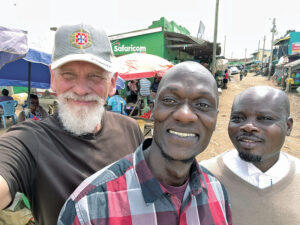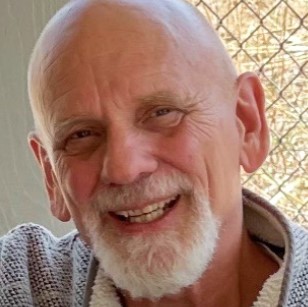 |
Evangelism can start with a simple, human question that leads to opportunities to share the hope you have in Jesus.
Human evangelism. The point is not evangelizing humans but how to evangelize humans in a human way. If you pay attention to how Jesus connected with people in the gospels, you will see incredible examples of human evangelism.
Jesus was on his last trip to Jerusalem. The hour of his suffering and death on the cross had come. But just outside Jerusalem, in Jericho actually, he watched Zacchaeus scurry up a tree because he wanted to see Jesus. Zacchaeus had likely heard about Jesus and his kind ways. He was interested in seeing Jesus but probably could not imagine that the famous rabbi would be interested in him. Jesus’ compassion for Zacchaeus moved him to change course from Jerusalem’s cross to Zacchaeus’ tree. Jesus went to him and said, “Zacchaeus, come down immediately. I must stay at your house today” (Luke 19:5).
Or consider Jesus’ human approach toward witnessing in John 4:4: “Now he had to go through Samaria.” John shows his readers how Jesus would not let centuries of hatred and intolerance against a whole nation keep him from sharing his gracious water of life with the people.
It’s important for Christians to read the Bible, but just reading the Bible does not automatically result in acts of evangelism. Evangelism, human evangelism, requires another step. To be an evangelist or to do evangelism, one has to go to humans, to hang out with humans, and to start conversations with humans.
A superpowerful, human question
A natural, normal, comfortable, ordinary, human way to share the gospel is to go to a person, engage that person in a conversation, and wait for a natural, normal, comfortable way to talk about Jesus in that conversation. The opportunity to talk about Jesus in almost any human conversation will present itself.
My witnessing starts with a question. This superpowerful but incredibly human question almost always leads to an evangelistic opportunity. Here it is: “How are you doing?” It sounds like I just said, “Hello.” But appropriate eye contact, an encouraging tone of voice, and nonthreatening body language make it clear that this question was not just hello but a sincere request. Assume that if you go to a human with the sincere intent to ask about his or her life, this human will be quite pleased to tell you. Assume that.
“How are you doing?” People share. And because I have been listening, I can say, “You shared that you felt uncertainty because of a stressful situation. May I share something that helps me get through uncertain times?”
That is another superpowerful question. “May I share something that helps me when I am feeling that burden you described?” Of all the times I have asked this follow-up question, only once has anyone said no. (And that was because I asked the question at an inappropriate time.) Every other time? The person said, “Sure.” And usually after I shared the appropriate gospel encouragement or Bible story with that person, I heard, “Thank you!”
When you ask people how they are doing and then listen carefully to their response, you can be confident that you will think of an appropriate way to encourage them with gospel truths and promises. Human evangelism sets aside the notion that you have to correct immediately every unscriptural idea that escapes an unbeliever’s mouth. Human evangelism rejects the notion that you have to master a body of doctrine before you can tell others what the Lord has done for you. You do not expect an unbeliever to ask a question you cannot answer. You expect an unbeliever to be encouraged by a specific word of comfort that speaks directly to a fear or a burden shared with you.
Human evangelism trusts what the Holy Spirit has already taught you through your reading of the Bible and your experience with a tenderhearted Savior. Trust the Holy Spirit to help you. Trust what he has already taught you. Trust your general knowledge of Scripture to allow you to reply with a perfectly appropriate answer. Trust your humanity! And trust that through the careful listening you just did, this person has been touched by your willingness to listen.
The human question in action
I was on a flight between San Antonio and Atlanta. Parents with a baby sat next to me. A long plane ride in silence would have been awkward. So after the plane was in the air, I asked the man, “How are you doing?” The man, sensing that my question was sincere, told me that he had just retired from a career in Marine special ops, was recently married, and he and his wife had just become parents. But that was the opening. Next came his sharing of his struggle with 16 years of memories carrying out secret and dangerous missions. Why would this man share such things with a stranger? Because the stranger was a fellow human who cared enough to ask, “How are you doing?”
I had only this one flight to encourage him and his wife, but I was privileged to share with him that he had served his country and God faithfully and had carried out his vocation with honor. I told him that his service, and that of his fellow soldiers, afforded us Christians the freedom to speak openly about the unconditional love of a perfect Savior who defeated the planet’s enemies: death, sin, Satan, shame, and the grave. We were just people who were willing to talk to each other. I was just one person sharing someone’s burden in an ordinary conversation. He was allowing me, the other person, a Christian person, to bear some of the weight.
A member of my congregation and I were knocking on doors in a neighborhood near the church. We were inviting people in the community to an event our congregation was hosting. A person in this neighborhood warned us about one house.
“Don’t go there,” she said. “He does not like church people!” Guess what we did? We went there. In a very natural, normal, encouraging, human way, I said, “Hello. My name is Allen. This is my friend, Chuck. We are from Christ Lutheran Church. We are out and about today to invite our neighbors to this event. How are you doing?”
That is pretty much exactly how I began this conversation. We stood there for an hour. The man was angry at God because he was afraid of God. His sins haunted him. Life’s disappointments embittered him. But we knocked on his door anyway. We just started a conversation. It turns out that the man on the other side of the door was a man like Zacchaeus, standing between the darkness of Satan and the warming light of God, struggling with life but willing to listen to a witness about the Author of life.
Reading the Bible is a great way to prepare for this kind of evangelism. It fills a Christian’s heart so that out of the Christian’s mouth, a Christian witness is ready to be shared. But then there is that next step. That’s taking a step toward a person who is in that spot, ready to be engaged, ready to be heard. And when you get to that person, it’s just so human to ask, “How are you doing?”
Do not worry. You will have a wonderful encouragement to share with this person. Trust the one of whom you witness. Trust your humanity too.
Witnessing and bananas

Last fall when I was teaching pastors and evangelists at our sister synod Lutheran Congregations in Mission for Christ–Kenya, I shared this approach to human evangelism. After discussing the details of the approach, we decided to experiment in the city that was hosting us. The task was to start a conversation, listen carefully, and respond appropriately. To be human.
The next day, we all gathered to share our stories. Pastor George came back with a report on his African variation on the “How are you doing?” question. He approached a vendor in the market and asked, “Why are your bananas so small?” The woman selling the bananas was nicked by the question. With sadness, she described to Pastor George how the drought in Kenya was causing hardship. Though the drought was not as severe in her region, there was still insufficient rain to produce a full-sized banana. After Pastor George listened carefully and compassionately to her struggle, he asked if he could share what was helping him get through the economic hardships of these times.
Pastor George was allowed to share, and his audience had grown. Other vendors heard him witnessing to the woman selling small bananas. His entire “congregation” was struggling with the impact of drought and received Pastor George’s witness with gratitude. It felt like rain to them. In this case, the Lutherans in this town were later able to follow up on those vendors.
All because of a simple, human question.
Author: E. Allen Sorum
Volume 110, Number 10
Issue: October 2023







